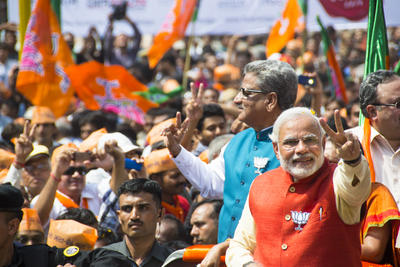Take for example the issue of fiscal discipline. Both the Indian National Congress party and the BJP have sworn to maintain fiscal discipline. But both parties do not give us an idea of how this fiscal discipline will be achieved and any timeframe for doing so. These examples are infinite. These long and densely written documents are also clearly not reader-friendly — perhaps to blur accountability.
The BJP manifesto attempts to be inspiring by talking of Shreshtha Bharat (Great India) and positing an India that works towards commanding rather than demanding its rightful place in the comity of nations and a place at the high table of global governance. This is in stark contrast to the Congress’ manifesto which posits no such aspirations and continues with its focus on entitlements as the only remedy. But it would have surely been more credible for the BJP to spell out the trajectory of economic growth and the principal drivers for achieving Shreshtha Bharat.
Still, the commendable feature of the BJP’s manifesto is its emphasis on economic growth; employment; raising the rate of domestic savings; improving the business environment for investors, including SMEs; raising R&D expenditures; and strengthening both social and physical infrastructure. By sticking their colours to the mast of growth and employment, the BJP has rightly sought to distinguish itself from the Congress’ tiresome focus on entitlements and handouts. It would have been even better if the manifesto had declared the BJP’s intention to steer the public away from market-distorting subsidies and handouts. This would have allowed it to distinguish its stance as promoting empowerment — not the debilitating culture of entitlements propagated by the Congress.
The youth of India, to which the manifesto makes a special appeal, desperately want to be empowered with employable skills and career-advancing education.
In this regard, the BJP’s detailed treatment of education infrastructure, skill creation by using Massive Open Online Courses, emphasising the need for large-scale teacher training programs, restructuring the University Grants Commission into the Higher Education Commission, and setting up a national E-Library, are all spot on. The manifesto would have greater appeal if it had promised to extend the facilities and provisions of the National Democratic Alliance’s own Sarva Siksha Abhiyan (The Education for All Movement) up to the 12th grade for girls.
This one measure would help achieve several positive outcomes, like pushing back the marriage and childbearing age for girls, making them more employable and hence empowered — improving gender equality. The BJP (if they come to power) should consider the implementation of this measure within the first 100 days of taking office. The absence of any mention of setting up community colleges and of the role of foreign universities in bringing in investment, technology and modern pedagogical methods to India’s education system is puzzling.
The BJP’s opposition to FDI in multi-brand retail, omission of foreign universities’ role, lack of spelling out the higher level of FDI in defence production, and the absence of financial sector reform to facilitate the entry of foreign entities, does not bode well. Especially when taken together with statements such as ‘we should no longer remain a market for the global industry’. It perhaps reflects the presence of some xenophobic and protectionist tendencies, which have unfortunately been an integral part of the BJP ideological package. That would indeed be a pity for a party that professes to portray a confident India and who ‘… believe[s] that Indian entrepreneurs have the capability to take on global markets’. With such globally competitive firms and professionals, India should become much more open and confident in interacting with the world — and use it for serving their national interest, as China has demonstrated can be done.
There are some specific assurances in the manifesto and hopefully the BJP will deliver on these. Some of these are: speedy and focused efforts to bring back black money stashed abroad; forming a ‘Team India’ with the participation of the Central Cabinet and State Chief Ministers; reviving and rejuvenating the moribund Inter-State Council and the National Development Council for Team India to become effective; allowing a greater role to state governments in foreign policy and in developing their relations with neighbouring countries; greater focus on delivery in government departments; rolling out a comprehensive strategy for bringing India’s police force on par with international standards; eliminating manual scavenging within a specified timeframe; rationalising and simplifying the tax structure without succumbing to heroic schemes like the bank transactions tax or eliminating direct taxes for those earning up to Rs. 10 lakh (about US$22,500); implementing the GST and other measures for creating a single national market in the country; and establishing a well-functioning single window clearance mechanism for both domestic and foreign investors.
Like all these documents, the BJP manifesto will perhaps not make much impact on the party’s electoral prospects. The manifesto, as it is drafted, adds to the Modi appeal of credible, clean, transparent and effective governance. That is the key feature of the Modi campaign and also of the manifesto. This is as it should be. The electorate, if it does vote for the BJP in numbers that opinion polls have been revealing, will do so principally because they desperately need a government that works and delivers. That will be the acid test for the new government. Modi has raised the country’s expectations sky-high on this count — the hope is that he will deliver.
Rajiv Kumar is Senior Fellow Centre for Policy Research, New Delhi, and former Director of the Indian Council for Research on International Economic Relations.
A version of this article first appeared here in India Today.

